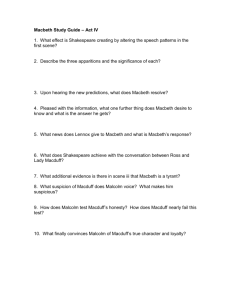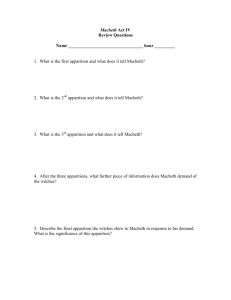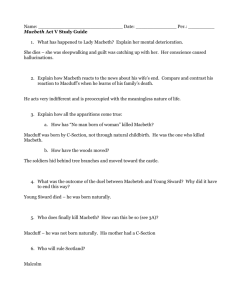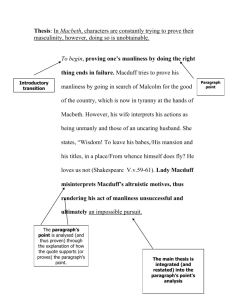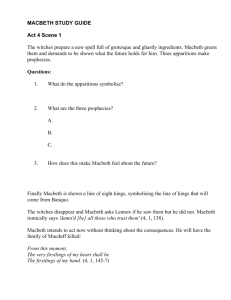WHAT HAPPENS IN ACT IV, MACBETH Scene I In a cave, the three
advertisement
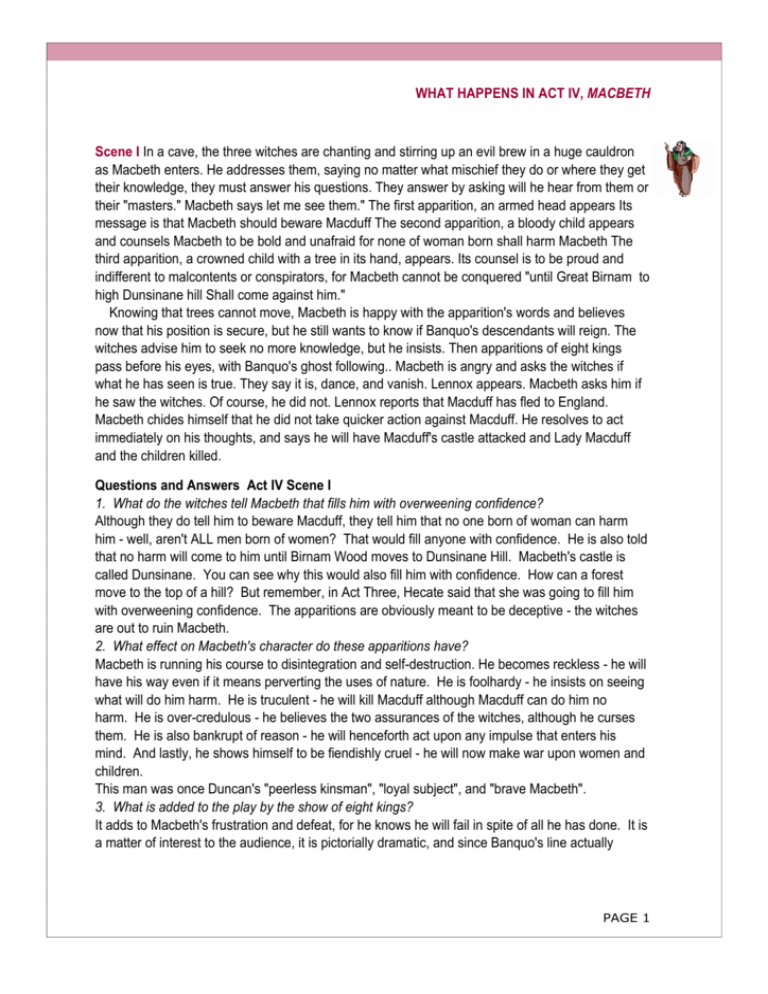
WHAT HAPPENS IN ACT IV, MACBETH Scene I In a cave, the three witches are chanting and stirring up an evil brew in a huge cauldron as Macbeth enters. He addresses them, saying no matter what mischief they do or where they get their knowledge, they must answer his questions. They answer by asking will he hear from them or their "masters." Macbeth says let me see them." The first apparition, an armed head appears Its message is that Macbeth should beware Macduff The second apparition, a bloody child appears and counsels Macbeth to be bold and unafraid for none of woman born shall harm Macbeth The third apparition, a crowned child with a tree in its hand, appears. Its counsel is to be proud and indifferent to malcontents or conspirators, for Macbeth cannot be conquered "until Great Birnam to high Dunsinane hill Shall come against him." Knowing that trees cannot move, Macbeth is happy with the apparition's words and believes now that his position is secure, but he still wants to know if Banquo's descendants will reign. The witches advise him to seek no more knowledge, but he insists. Then apparitions of eight kings pass before his eyes, with Banquo's ghost following.. Macbeth is angry and asks the witches if what he has seen is true. They say it is, dance, and vanish. Lennox appears. Macbeth asks him if he saw the witches. Of course, he did not. Lennox reports that Macduff has fled to England. Macbeth chides himself that he did not take quicker action against Macduff. He resolves to act immediately on his thoughts, and says he will have Macduff's castle attacked and Lady Macduff and the children killed. Questions and Answers Act IV Scene I 1. What do the witches tell Macbeth that fills him with overweening confidence? Although they do tell him to beware Macduff, they tell him that no one born of woman can harm him - well, aren't ALL men born of women? That would fill anyone with confidence. He is also told that no harm will come to him until Birnam Wood moves to Dunsinane Hill. Macbeth's castle is called Dunsinane. You can see why this would also fill him with confidence. How can a forest move to the top of a hill? But remember, in Act Three, Hecate said that she was going to fill him with overweening confidence. The apparitions are obviously meant to be deceptive - the witches are out to ruin Macbeth. 2. What effect on Macbeth's character do these apparitions have? Macbeth is running his course to disintegration and self-destruction. He becomes reckless - he will have his way even if it means perverting the uses of nature. He is foolhardy - he insists on seeing what will do him harm. He is truculent - he will kill Macduff although Macduff can do him no harm. He is over-credulous - he believes the two assurances of the witches, although he curses them. He is also bankrupt of reason - he will henceforth act upon any impulse that enters his mind. And lastly, he shows himself to be fiendishly cruel - he will now make war upon women and children. This man was once Duncan's "peerless kinsman", "loyal subject", and "brave Macbeth". 3. What is added to the play by the show of eight kings? It adds to Macbeth's frustration and defeat, for he knows he will fail in spite of all he has done. It is a matter of interest to the audience, it is pictorially dramatic, and since Banquo's line actually PAGE 1 ACT IV, MACBETH extended to James I of England (who was also James VI of Scotland) it is a touch of homage to the reigning monarch of the time, James I. Scene II Ross is comforting Lady Macduff who does not understand why her husband has left so suddenly and considers it desertion. Ross cannot tell her why Macduff has gone but says he acted wisely, and counsels patience saying things will improve He then leaves. Lady Macduff and her little son have a conversation The child seems wise beyond his years. A messenger interrupts them, tells Lady Macduff that she and her children are in danger and should flee, then leaves quickly himself. Lady Macduff is frightened and does not know where she should go. Almost immediately the murderers come in, looking for Macduff and calling him traitor When the boy tries to defend his father's name, the murderers stab him, then run after Lady Macduff who is trying to escape Questions and Answers Act IV Scene II 1. What has this scene given us? It has given us the fulfilling of Macbeth's purpose to annihilate the Macduffs (Macduff himself has escaped); Macbeth at his worst, as we would suppose in making war on women and children; a good deal of pathos, and readiness on the reader's part to see retribution overtake Macbeth. 2. Describe the character of Lady Macduff. She is the one good, gentle, noble, loyal and intelligent woman in the play. In nearly all respects she is a contrast to Lady Macbeth. Though Lady Macduff is hurt at her husband's unexplained departure, she is at the last loyal to him. She is brave, even playful, before her son in the face of danger; she is a "friend" to the little fellow, and she speaks with courageous defiance to the murderer. Lady Macduff, like King Duncan, is a victim of warring times. Her own words say it I have done no harm. But, I remember now I am in this earthly world, where to do harm Is often laudable; to do good, sometime Accounted dangerous folly. Scene III Macduff in England with Malcolm, tells him the sorry state that Scotland is in. At first, Malcolm seems not to trust Macduff, fearing a trap set by Macbeth, but soon he has no doubt to Macduff's sincerity. To test Macduff, Malcolm says that should he himself become king he has more faults than Macbeth, and he lists them. Macduff despairs for Scotland, but then Malcolm admits that he was merely testing Macduff's loyalty He says Siward has already raised an army of 10000 men to challenge Macbeth, and he asks Macduff to join him and Siward. Ross appears and talks first of the sorry state of Scotland, but Macduff asks him for more personal news of his wife and children At first Ross says only that they were at peace when he left them. Finally, he tells Macduff that his wife, children, even his servants, are murdered. Malcolm's immediate PAGE 2 ACT IV, MACBETH reaction is that Macduff should take revenge. Macduff at first, is stunned, then blames himself, realizing they were killed in his place. Finally, he says he will seek out Macbeth and take his revenge. Malcolm says they will go immediately to King Edward and then depart for Scotland. Questions and Answers Act IV Scene III Describe how Malcolm is portrayed in this scene. Malcolm has become mature and a capable leader. He is now a new person in this scene mature, philosophical, cautious, shrewd, loyal, good - a man of action and a leader of men. Shakespeare has given him much maturity within the space of two years. Malcolm is made superior to the veteran Macduff. He talks like a sage. He is cautious in his approach to Macduff, shrewd in the way he tests him, and his loyalty to Scotland shines through his talk. His goodness is almost too apparent, since it is a claim made by himself. His ability to guide and lead is shown when he converts Macduff's grief to anger, teaches him to "enrage the heart, not blunt it", and leads him to the king for the consummation of their plans. Malcolm is now a very different person from the Malcolm whom we met in Act One Scene Two, safe in his father's tent after having narrowly escaped captivity, and possibly death. Malcolm proved, in a reign of thirty-five years, to be a good man, and his wife became the beloved Margaret of Scotland, later Saint Margaret. PAGE 3


